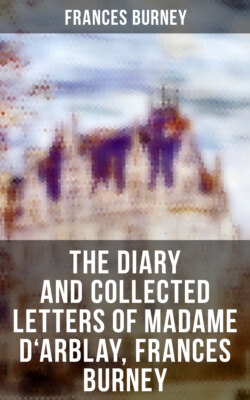Читать книгу The Diary and Collected Letters of Madame D'Arblay, Frances Burney - Frances Burney - Страница 54
На сайте Литреса книга снята с продажи.
Bath Easton and Sceptical Miss W——
ОглавлениеThursday, June 8.—We went to Bath Easton. Mrs. Lambart went with us.
The house is charmingly situated, well fitted up, convenient, and pleasant, and not large, but commodious and elegant. Thursday is still their public day for company, though the business of the vase is over for this season.
The room into which we were conducted was so much crowded we could hardly make our way. Lady Miller came to the door, and, as she had first done to the rest of us, took my hand, and led me up to a most prodigious fat old lady, and introduced me to her. This was Mrs. Riggs, her ladyship’s mother, who seems to have Bath Easton and its owners under her feet.
I was smiled upon with a graciousness designedly marked, and seemed most uncommonly welcome. Mrs. Riggs looked as if she could have shouted for joy at sight of me! She is mighty merry and facetious, Sir John was very quiet, but very civil.
I saw the place appropriated for the vase, but at this time it was removed. As it was hot, Sir John Miller offered us to walk round the house, and see his greenhouse, etc. So away we set off, Harriet Bowdler accompanying me, and some others following.
We had not strolled far ere we were overtaken by another party, and among them I perceived Miss W— my new sceptical friend. She joined me immediately, and I found she was by no means in so sad a humour as when I saw her last, on the contrary, she seemed flightily gay.
“Were you never here before?” she asked me.
“No.”
“No? why what an acquisition you are then! I suppose you will contribute to the vase?”
“No, indeed!”
“No more you ought; you are quite too good for it.”
“No, not that; but I have no great passion for making the trial. You, I suppose, have contributed?”
“No, never—I can’t. I have tried, but I could never write verses in my life—never get beyond Cupid and stupid.”
“Did Cupid, then, always come in your way? what a mischievous urchin!”
“No, he has not been very mischievous to me this year.”
“Not this year? Oh, very well! He has spared you, then, for a whole twelvemonth!”
She laughed, and we were interrupted by more company.
Some time after, while I was talking with Miss W— and Harriet Bowdler, Mrs. Riggs came up to us, and with an expression of comical admiration, fixed her eyes upon me, and for some time amused herself with apparently watching me. Mrs. Lambart, who was at cards, turned round and begged me to give her her cloak, for she felt rheumatic; I could not readily find it, and, after looking some time, I was obliged to give her my own; but while I was hunting, Mrs. Riggs followed me, laughing, nodding, and looking much delighted, and every now and then saying,
“That’s right, Evelina—Ah! look for it, Evelina!—Evelina always did so—she always looked for people’s cloaks, and was obliging and well-bred!”
I grinned a little, to be sure, but tried to escape her, by again getting between Miss W— and Harriet Bowdler; but Mrs. Riggs still kept opposite to me, expressing from time to time, by uplifted hands and eyes, comical applause, Harriet Bowdler modestly mumbled some praise, but addressed it to Miss Thrale. I begged a truce, and retired to a chair in a corner, at the request of Miss W— to have a tête-à-tête, for which, however, her strange levity gave me no great desire. She begged to know if I had written anything else. I assured her never.
“The ‘Sylph,’” said she, “I am told, was yours.”
“I had nothing at all to do with that or anything else that ever was published but ‘Evelina;’ you, I suppose, read the ‘Sylph’ for its name’s sake?”
“No; I never read novels—I hate them; I never read ‘Evelina’ till I was quite persecuted by hearing it talked of. ‘Sir Charles Grandison’ I tried once, but could not bear it; Sir Charles for a lover! no lover for me! for a guardian or the trustee of an estate, he might do very well—but for a lover!”
“What—when he bows upon your hand! would not that do?”
She kept me by her side for a full hour, and we again talked over our former conversation; and I enquired what first led her to seeking infidel books?
“Pope,” she said; he was himself a deist, she believed, and his praise of Bolingbroke made her mad to read his books, and then the rest followed easily. She also gave me an account of her private and domestic life; of her misery at home, her search of dissipation, and her incapability of happiness.
